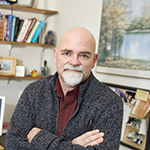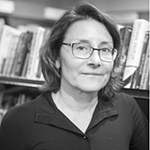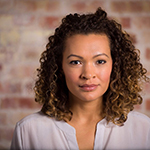What’s on your summer reading list? Here’s what faculty are digging into

Whether you prefer to breeze through a half-dozen beach reads or challenge your intellectual acumen with a couple 800-page brain-busters, the summer months provide a unique opportunity to explore what the literary world has to offer. Here’s what a handful of faculty are reading these days.
John Coley, associate professor of psychology
Science Blind, by Andrew Shtulman
A cognitive scientist, Shtulman has integrated a large amount of empirical  research on how our intuitive understanding of the world can often clash with scientific knowledge and presented it in an accessible form for a broad audience. I’m reading this—and discussing it with my lab—because it’s closely connected to the research that we do and because I’m teaching a seminar using the book in the fall.
research on how our intuitive understanding of the world can often clash with scientific knowledge and presented it in an accessible form for a broad audience. I’m reading this—and discussing it with my lab—because it’s closely connected to the research that we do and because I’m teaching a seminar using the book in the fall.
Born to Run, by Bruce Springsteen
Springsteen’s music was the soundtrack of my coming of age, and I still find it deeply moving. He is also an insightful, articulate, and thoughtful human being, and I look forward to hearing what he has to say about his life. I’m considering going with the audio book for this one, to hear it in his voice.
The Wars of the Roses: The Fall of the Plantagenets and the Rise of the Tudors, by Dan Jones
I’m reading this one because I’m a huge history geek and have always been fascinated by this period of dynastic struggle in 15th-century England. Jones conveys the history of this tumultuous time in a thoughtful, well-informed, and highly readable way—but he’s dead wrong about Richard III.
Lorna Hayward, associate professor of physical therapy, member of the 2017 First Pages selection committee
On Tyranny, by Timothy Snyder
 I read this book to try to make sense of the current political climate that we are in right now. Being in the health field, there is little opportunity to read about politics, and I enjoyed learning the meaning of a lot of new words used freely by historians.
I read this book to try to make sense of the current political climate that we are in right now. Being in the health field, there is little opportunity to read about politics, and I enjoyed learning the meaning of a lot of new words used freely by historians.
Research on Service-Learning: Conceptual Frameworks and Assessment, by Patti Clayton, Robert Bringle, and Julie Hatcher
Specifically, I am learning about the SOFAR model and exchange theory to inform an article I am writing on my decade-long community partnership with Northeastern and the For His Children orphanages in Ecuador.
Murder in Amsterdam, by Ian Buruma
I borrowed this book from my daughter, who just finished her freshman year at Northeastern. It describes the gestalt of Amsterdam as a country that historically has welcomed foreigners, as well as the nation’s 2004 clash between east and west. I am reading this book because my family is traveling to Amsterdam to stay on a houseboat in August and I wanted to learn a little bit more about the political history of the place.
Timothy Hoff, professor of management, healthcare systems, and health policy
Kings of the Road: How Frank Shorter, Bill Rodgers, and Alberto Salazar Made Running Go Boom, by Cameron Stracher
 As a competitive runner, this book takes a great historical look at the key figures who helped to create the “running boom” in the U.S. during the 1970s—all of whom were running idols for me growing up. So I have a personal connection to the story, and was able to learn more about the sport that has helped define my own life. It’s a book that makes you want to go out and run every time you pick it up.
As a competitive runner, this book takes a great historical look at the key figures who helped to create the “running boom” in the U.S. during the 1970s—all of whom were running idols for me growing up. So I have a personal connection to the story, and was able to learn more about the sport that has helped define my own life. It’s a book that makes you want to go out and run every time you pick it up.
Shoe Dog: A Memoir by the Creator of Nike, by Phil Knight
Also a running book in many ways, this memoir is about the start and growth of one of the most influential and successful companies in the world as well as the entrepreneurial spirit that drives start-ups in the face of resistance and competition. Love or hate Nike, they helped to redefine how we think about athletics in our lives. As a competitive runner and business school professor, this book is a must-read.
Sarah Jackson, assistant professor of communication studies
Citizen: An American Lyric, by Claudia Rankine
 Rankine is one of the most brilliant poets of our time, and this is my second read of her searing and moving collection on race and racism in 21st-century America.
Rankine is one of the most brilliant poets of our time, and this is my second read of her searing and moving collection on race and racism in 21st-century America.
Tao Te Ching, by Lao Tzu
A classic of world literature, I actually carry a pocket version of this 2,000-year-old text around with me all year long. I find it particularly inspirational in the lessons it offers in what makes a compassionate and just leader and the necessary relationship between knowledge and humility.
Black Panther, by Ta-Nehisi Coates and Brian Stelfreeze
I’ve been a huge comic book nerd my whole life. Comics have been on the cutting edge of addressing some of the most important themes of inclusion and exclusion in our society since their inceptions and Marvel, in my opinion, is particularly good at this. When it tapped the incredible Ta-Nehisi Coates to help bring this 1960s superhero back to life for a new generation, I was giddy and it hasn’t disappointed.
Atonement, by Ian McEwan
I enjoy reading the novels that high-profile films are based on with enough time in between that the film version doesn’t disrupt my experience with the novel. I saw this one sitting on the street in a basket marked “free” in April and had to grab it. It’s a compellingly told story that brings together themes around class, power, the consequences of social expectations, and personal subjectivity.
The Feminist Utopia Project: Fifty-seven Visions of a Wildly Better Future, edited by Alexandra Brodsky and Rachel Kauder Nalebuff
This is an incredible anthology that brings together more than 50 leaders in entertainment, academia, activism, law, education, and other fields to contribute short essays on what a feminist utopia would look like. There is so much humor and inspiration in this book I’ve started giving it as a gift to basically everyone.
Neal Lerner, associate professor of English, director of the Writing Program, member of the 2017 First Pages selection committee
Ice Ghosts, by Paul Watson
This is an account of the search for two British ships that disappeared in the  Arctic Sea in the mid-19th century. I often read non-fiction that combines science, travel, and detective work, so I’m really looking forward to this one.
Arctic Sea in the mid-19th century. I often read non-fiction that combines science, travel, and detective work, so I’m really looking forward to this one.
Social: Why Our Brains Are Wired to Connect, by Matthew Lieberman
Social is a nonfiction exploration of why humans are social creatures. That’s pretty much the basis of my research into how, when, and why people write, so I look forward to Lieberman’s “popular neuroscience” perspective.
Tom Vicino, associate professor of political science, public policy, and urban affairs
Suburb: Planning Politics and the Public Interest, by Royce Hanson
 This book chronicles the smart growth movement in Maryland, where I grew up. In the 1990s, Maryland was a pioneer in the sustainability movement in its regulation of urban sprawl that many states later adopted.
This book chronicles the smart growth movement in Maryland, where I grew up. In the 1990s, Maryland was a pioneer in the sustainability movement in its regulation of urban sprawl that many states later adopted.
The Cost of Courage, by Charles Kaiser
I’m a big history buff, and I enjoy the personal stories of World War II. In this book, Kaiser charts the story of one family’s role during the French Resistance.
When We Rise: My Life in the Movement, by Cleve Jones
At the beginning of every summer, we commemorate Gay Pride. This autobiography shows the importance of community in the struggle for equality.




